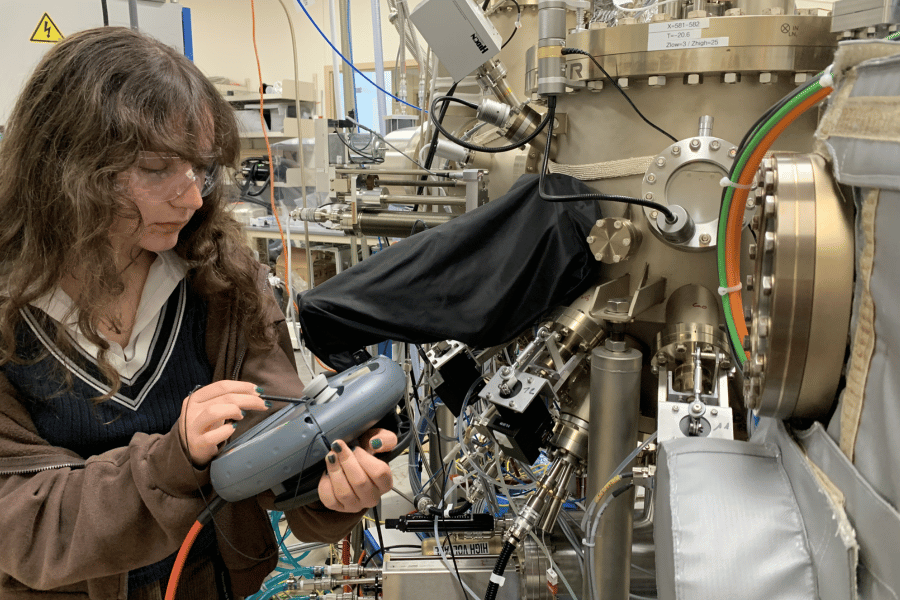This article is adapted from a story originally published by Argonne National Laboratory.
BLOOMINGTON, Ill. — As part of the Open Quantum Initiative (OQI) Undergraduate Fellowship, Illinois Wesleyan University physics and mathematics major Wanda Lindquist '26 was one of 17 undergraduate students that participated in quantum-science research projects hosted at multiple institutions across the Midwest over the summer.

The OQI is a group of researchers, educators and leaders in the Chicago Quantum Exchange that champions diversity, equity and inclusion in quantum information science (QIS). The goal of the OQI Fellowship is to expand the quantum workforce into a more diverse and inclusive community by helping undergraduate students from a broad variety of backgrounds gain hands-on experience.
Wanda Lindquist was among four OQI undergraduates who spent the summer in the U.S. Department of Energy’s (DOE) Argonne National Laboratory developing QIS technologies. She also contributed specifically to research at Q-NEXT, a DOE National Quantum Information Science Research Center led by Argonne. Upon finishing the fellowship, Lindquist became a Student STEM Ambassador for Argonne National Laboratory, helping represent Argonne at conferences and career fairs.
In addition to this fellowship, Lindquist is president for the Institute for Electrical and Electronics Engineers, president for International Society for Optics and Photonics and president for Pi Mu Epsilon honorary national mathematics society. She is also involved as a member of the Society of Physics Students, Association for Women in Mathematics, Quantum Technology Engineers, and she serves as teaching assistant for introductory physics sequence, math methods and quantum information science courses at IWU.
Here’s what Lindquist had to say about the OQI summer experience:
Q: What is the focus of your OQI research?
A: My lab group works on the development, growth and characterization of thin film
quantum materials to use for the eventual creation of quantum repeater technologies.
Quantum repeaters allow information to be sent through a quantum network without loss.
We focus on oxides and add the element erbium into these materials to make quantum
devices that emit signals.
Q: What is your role?
A: I work on growing the thin film, which we do via a technique called molecular beam
epitaxy.
Q: What have you gained from the OQI experience?
A: It’s been really cool to be able to work on things in an experimental setting.
In a class setting, it’s typical to focus more on the theory because it may not be
possible to work on the tactile things. Getting to work in the lab and seeing and
holding the crystals that we produce adds another layer of connection when learning
about a topic. Coming to a national lab, I was able to see quantum physics in a real-life,
cutting-edge setting. I feel very lucky to see professional laboratory methodology
up close.
Q: What new perspectives do you have about QIS?
A: Before this experience, I was mainly focused on quantum computing and qubits, but
now I’ve had the opportunity to see that there are so many different applications
within quantum, like quantum sensing or quantum memory. For example, during our OQI
fellowship, we went to New York and met with people from JPMorgan Chase. Initially,
you’d think, “Why do they need quantum physicists for a finance company?” It’s because
quantum has applications in so many areas. JPMorgan is researching various quantum
algorithms because it needs people to create efficient algorithms for finance modeling.
My perspective on QIS has broadened because I realized you don’t necessarily need
to be computing to do research in quantum.
Q: What’s next for you?
A: I’m excited to go back to Illinois Wesleyan to help grow quantum engagement on
campus. Last year, we founded a club called Quantum Technology Engineers. With my
OQI experience, I look forward to encouraging others to learn more about the field.
I’m also a teacher’s assistant, so I look forward to sharing my experience to show
others what they can do in QIS.
Q: What do you enjoy doing outside of research?
A: I’m really into history, specifically ancient Roman politics and religion, which
were very intertwined. It’s very interesting to track the changes that happened over
the course of the republic and empire, as Rome expanded and absorbed other cultures.
I also enjoy going for a run (as long as it's cold out) or a good round of minesweeper
to get out of my head.
Q: Any last thoughts?
A: I am so grateful to everyone at the CQE who made this fellowship possible, especially
those behind the scenes. It was a really amazing experience that I’m sure took a lot
of work to curate, so I am very thankful for that.